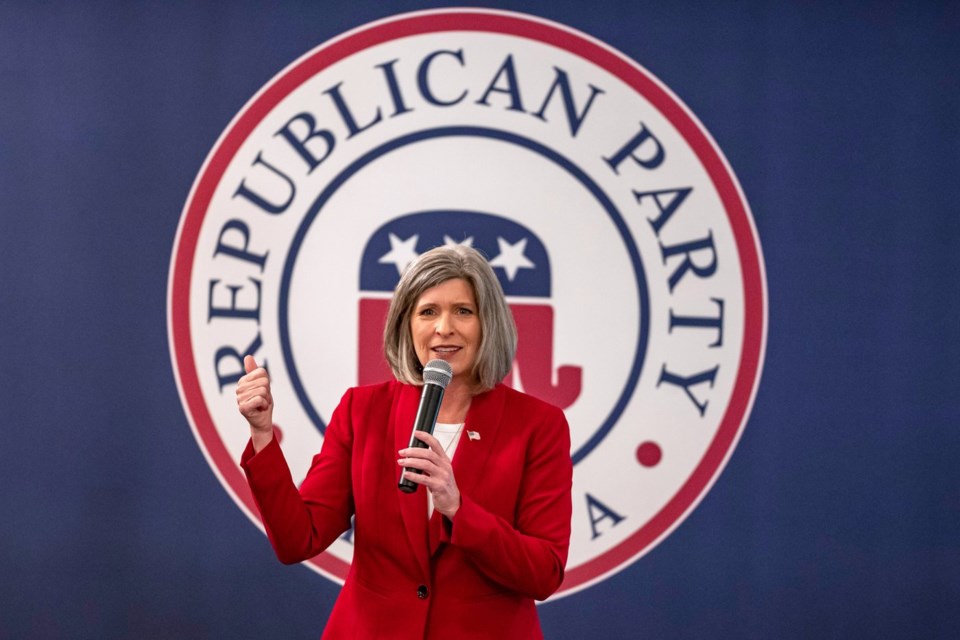DES MOINES, Iowa (AP) — U.S. Sen. Joni Ernst, an Iraq War combat veteran and Iowa’s first woman elected to Congress, is expected to announce next month she will not seek reelection, leaving another vacancy in an Iowa seat that could have ripple effects down the ballot as Democrats look to the state for pickup opportunities.
As Senate Republicans work to maintain their majority in the chamber, Ernst is joining a wave of her peers making headaches for the party. Sen. Thom Tillis of North Carolina turned down a reelection bid after clashing with President Donald Trump.
Ernst plans to announce in September that she will opt out of the race for a third term, according to three people familiar with her plans who spoke Friday on the condition of anonymity to preview the announcement.
Ernst, a former Army National Guard member and a retired lieutenant colonel, was first elected to an open Senate seat in 2014. She served for several years in the No. 3 spot in the Senate GOP leadership and was considered a vice presidential contender for Trump’s first White House run.
Her decision comes after Iowa Gov. Kim Reynolds, the state’s first female governor, said she would not run for reelection. It prompted the state’s many Republican elected officials to consider the open opportunity to run for higher office, a process that may begin again with Ernst’s departure.
Democrats look to mount an Iowa comeback
Democrats have been looking for an opportunity to mount a political comeback in the once-competitive state, an uphill battle even in the potentially favorable midterm year. Ernst drew backlash after a retort about Medicaid cuts at a town hall. As Ernst explained that the legislation protects Medicaid for those who need it most, someone in the crowd yelled that people will die without coverage, and Ernst responded: “People are not ... well, we all are going to die.”
The crowded primary field of Democratic candidates for the Senate have capitalized on that moment and Ernst’s Senate votes for early messaging. They’ll have to pivot once other Republicans enter the fray.
The election will be without an incumbent for the first time since 2014, when Ernst was elected in the first open Senate race in decades. Chuck Grassley, Iowa’s senior U.S. senator, has held his seat for 45 years.
Ernst emerged among a field of lesser-known candidates seeking the Republican nomination in 2014, rising to national recognition with advertisements that spoke of her experience slinging guns and castrating hogs. She won reelection in 2020 by more than 6 percentage points, coming in with just shy of 52% of voters.
Among Trump supporters, Ernst made waves earlier this year after signaling a hesitance to support his pick for the secretary of the Department of Defense, Pete Hegseth. Hegseth has said in the past that he did not think women should serve in combat roles, and he was accused of a sexual assault that he denies.
But Ernst, who is herself a survivor of sexual assault and has worked to improve how the military handles claims of misconduct, made clear she wanted to hear him respond to those points. It provoked a pressure campaign that underscored Trump’s power on Capitol Hill and included threats of a bruising primary.
It wasn’t the first time Ernst went toe-to-toe with Trump supporters. She also faced condemnation for her 2022 vote to protect same-sex marriage.
Still, Ernst would have benefited from nearly 200,000 more active voters registered as Republicans than Democrats, a significant shift from even a few years ago. Ernst announced a campaign manager in June, an October date for her annual fundraiser and had raised just shy of $1.8 million in the first half of the year.
Likely candidates for the seat
Third-term Rep. Ashley Hinson from the Cedar Rapids area in eastern Iowa, is widely viewed as likely to enter the race. Two of Iowa’s four congressional seats already have been among the more competitive in the country over the past several elections.
Should Hinson enter the Senate race, that would make her district, where she won with 57% of the vote in 2024, more competitive, Iowa Republican strategist Luke Martz said.
“We’re going into what could be a tumultuous midterm, with two seats already highly targeted. This would be a third, depending on who we nominate,” Martz said.
Several Democrats are seeking the party’s nomination for the seat, including state Sen. Zach Wahls; state Rep. Josh Turek; Jackie Norris, chair of the Des Moines School Board; and Nathan Sage, a former chamber of commerce president.
Two Republicans — former state Sen. Jim Carlin and veteran Joshua Smith — had already entered the primary to challenge Ernst.
Trending Republican
Iowa, which had been a perennial swing state, has trended Republican over more than a decade, with Republicans winning the governorship since 2010 and both U.S. Senate seats since 2014.
After Democrat Barack Obama carried the state in 2008 and 2012, Trump has gone on to carry it three consecutive times, and by his widest margin, 13.2 percentage points, last year.
___
Seung Min Kim and Joey Cappelletti reported from Washington.
Seung Min Kim, Hannah Fingerhut And Joey Cappelletti, The Associated Press



